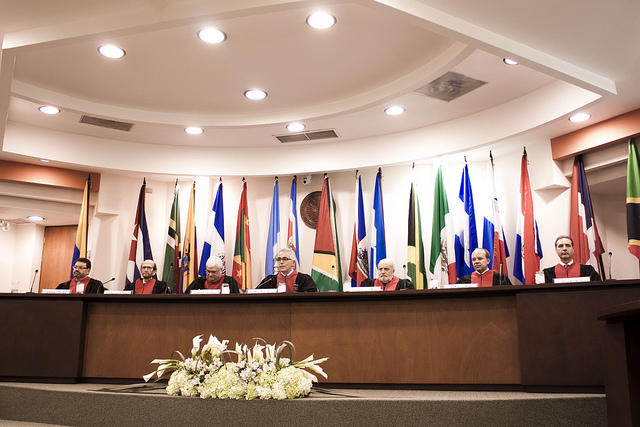






San Jose, Costa Rica Sunday, May 18, 2014. The State of Guatemala expressed again its refusal to comply with its obligation to investigate, identify, try and punish those responsible for the grave violations of human rights that occurred during the internal armed conflict. This occurred during a hearing convened by the Inter-American Court of Human Rights (IA Court) last Friday, May 16 in San Jose, Costa Rica.
The Court convened a private hearing to analyze the compliance with the ruling of the cases of Nicholas Chapman Blake, Maritza Urrutia, Plan de Sánchez Massacre, Carpio Nicolle, Tiu Tojin, Florencio Chitay Nech, Mack Chang, Street Children (Villagran Morales and others), Bámaca Velásquez, Molina Theissen and the Dos Erres Massacre. The victims and their representatives from the Bufete Jurídico de Derechos Humanos (BDH), the Center for Human Rights Legal Action (CALDH), the Myrna Mack Foundation and the Center for Justice and International Law (CEJIL) participated in the hearing.
In the hearing, which lasted two hours, the various obstacles that exist in Guatemala and that hinder the progress in finding truth and justice were highlighted. Difficulties that are faced in the initial steps of the investigation were mentioned, like the lack of access to information that is held by the Ministry of Defense. At the same time, the problem relative to the abuse of appeals for legal protection and the complicity of the authorities that receive them with the only objective of delaying the procedures was reiterated.
The victims and representative organizations referred to the paralysation of various processes by virtue of actions of the defense that seek the application of the National Law of Reconciliation to exempt the military members who were allegedly involved in the massacres, forced disappearances and other grave violations from responsibility.
Furthermore, the recent decision of the Guatemalan Congress (resolution 3-2014) was reported to the IA Court that expressly does not recognize the international commitments undertaken by the State, denies the genocide, improperly interferes with judicial independence and announces a reform that could implicate amnesty of the cases linked to the armed conflict.
In that regard, numerous judgments of the Inter-American Court have noted that in cases of grave human rights violations, the application of measures like amnesty, pardon, prescription and the establishment of other methods of exclusion of responsibility is unacceptable.
During the hearing, the advances in the fight against impunity were also recognized, however, it was noted that they were due to the determined push from the victims and the political will of some key actors in positions of the administration of justice. Nevertheless, concern was expressed about the imminent institutional changes that could reverse the advances made in recent years.
The victims and the organizations regretted the position that the Guatemalan State expressed, which openly denied its obligation to guarantee truth and justice. Additionally, the State dedicated the majority of its time justifying the impunity for the perpetrators of thousands of extrajudicial killings, hundreds of massacres, tens of thousands of forced disappearances, among other violations that damage the most essential principles of humanity.
The representatives of the Inter-American Commission on Human Rights (CIDH) remind the State of its international obligations and the consistent jurisprudence of the Inter-American Court in relation to the duty to investigate, try and punish those who commit acts in violation of the American Convention on Human Rights and other international treaties. See press release
Lucrecia Molina, one of the victims present at the hearing, spoke on behalf of her forcibly disappeared brother, Marco Antonio Molina Theissen, a 14 year old boy, asking the Court to keep in mind the victims of the armed conflict and affirmed that, “the Guatemalan State violated its own law to persecute us, victimize us, to massacre, to perpetrate genocide, to disappear thousands, and now it denies us our right to truth and justice.”
In the next few months, the Inter-American Court will issue its new ruling on Guatemala, in relation to which the victims and their representatives have requested forcefulness in reminding the State of its international commitments, as well as to reiterate a series of specific measures so that the authorities effectively progress in the identification and punishment of those responsible for the acts.
CEJIL calls on the Guatemalan authorities to reconsider their position that clearly violates international law and the rights of the victims. Guatemala must provide social peace through the guarantee of access to truth and justice.
Related Links:
IACHR Press Release: IACHR Urges Guatemala to Continue Complying with its International Obligations and Fighting against Impunity
Contextual Information
During the armed conflict, at least 2000 000 people were killed and at least 45 000 were forcibly disappeared. Nevertheless, since 1996, only 31 of those responsible in seven cases have been condemned, meaning that less than 1% of the grave violations have received a response from the State.
The State of Guatemala ratified the Inter-American Convention on Human Rights in 1978 and recognized the Inter-American Court in 1987. It is the second country with the most judgments issued by the Inter-American Court, the majority of which are related to grave human rights violations that involve extrajudicial executions, forced disappearances and massacres.
In accordance with the victims’ representatives, the principle obstacles in the compliance with the judgments, already recognized by the IA Court, include:
¡Ayúdanos a continuar este trabajo crítico y urgente con una donación!
DONA AHORA